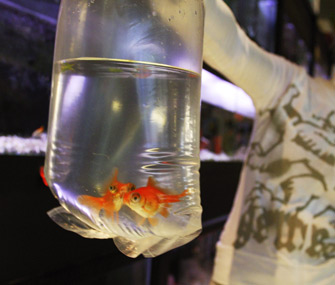Why ‘Winning’ a Pet Is a Bad Idea
Published on August 05, 2013

We’ve all been there: strolling along the boardwalk with our family on a warm summer night when we stumble upon kids gathered around a lit-up display, some of whom giddily walk away with small plastic boxes containing hermit crabs. Then comes the pressure to join the fun, despite the fact that you are far away from home and never thought about such a pet up until this second.
Then there are the turtles, rabbits, small lizards and bagged-up goldfish who come home as summer carnival prizes. In the heat of the moment, a young animal lover can become quite determined to win the cute little animal prize. Heck, kids (or their parents) might even feel like they are rescuing them. But by paying money for the game and taking home their unexpected “prizes,” kids and their parents are creating more demand for an industry that has everything but the animals’ well-being as a priority. Because of this, many states and localities have enacted laws to ban giving certain animals as prizes, like chicks and rabbits, and some states prohibit awarding any type of animal as a prize. It gets confusing, though, because some laws will allow animals to be won in games of skill but not in games of chance.
“Throwaway” Pets?
So what’s all the fuss about a measly little crab, you might ask? Well, despite their name, hermit crabs are not solitary animals and actually naturally travel in groups. Properly cared for, they can live for decades and can actually be quite engaging little creatures. Hermit crabs do not breed in captivity, so those sold as pets are captured from the wild. Furthermore, their care is a lot more specialized than you might think. That little cage they are typically sold with at the boardwalk is not sufficient for their well-being. They need proper food and water, adequate space (at least a 10-gallon tank), lighting, humidity, new shells to move into, etc. What’s more, their shells are often painted and peddled in tourist areas, and they are even offered for “free” after you buy the inadequately sized cage. This is really nothing more than a scam that results in a tremendous number of impulse buys.
Goldfish are also commonly offered to kids as carnival prizes, party favors and super-cheap pets. You often see them in plastic bags and tiny bowls, but actually, they each require rather large aquariums to thrive. These friendly little fish can live 15 to 20 years, but most do not survive very long because of their inadequate conditions prior to purchase or lack of proper care once they become pets. While goldfish are somewhat hardy, they are not indestructible, and the trip from carnival to home or hotel room usually does most of them in within the first few hours to days.
Reverence for Life
While these types of animals make for inexpensive pets, their care often isn’t taken seriously enough. We often hear about pet fish dying and being “flushed down the toilet,” or of other small creatures that may survive the trip home from vacation or the fair but die shortly afterward. What does this teach our children about respecting living beings or nature? Is it right for animals to be prizes or giveaways? What is their value compared to other animals we have as pets? Should they exist only to entertain us for a few short days or weeks?
I recently wrote about why reptiles and other exotic animals do not make good pets, and the reasons I cited are much the same for the animals being discussed here. Creatures that can seem deceptively “simple,” such as a crab or a fish or a lizard, can actually have complex care needs and require far more commitment in terms of time, money and interest than is realized.
The Real “Take-Home” Message
As we enter the last few days of summer, think about the memories and souvenirs you want to bring home with you from your family’s summer outings. If your children are fascinated by animals, that is a wonderful thing that should be encouraged, but make sure they are able to explore that curiosity in a way that increases both their knowledge and compassion. Rather than bringing home a live animal you may not be prepared for, here are some of my recommendations on how to deal with any boardwalk and carnival temptations:
- Never buy a pet on vacation or attempt to win one as a prize. Even if you feel like you are helping them, you are creating demand for more of these animals to be bred or captured.
- Once the heat of the moment has passed, if your family decides it really does want to acquire such a pet, come home and do your research about its needs and be sure you have the supplies on hand for its proper care.
- When you come home, you can also contact your local animal shelter or rescue to see if they already have such animals available for adoption or if they can put you on a waiting list. You would be surprised how many animals are available for rescue and adoption. For example, there are plenty of local hermit crab and goldfish pet rescues throughout the country. Google to see what’s in your area.
- Finally, while you are at the boardwalk or a fair, if you are concerned about the conditions in which the animals are being kept, contact the local SPCA or animal control officer as well as any other entity you think could be of assistance such as a chamber of commerce.





